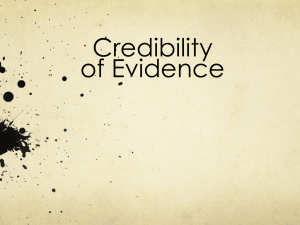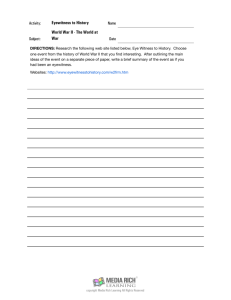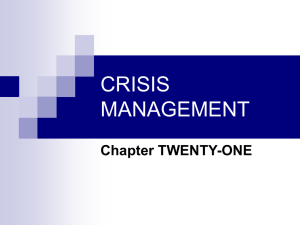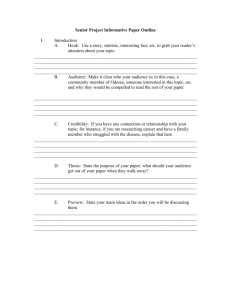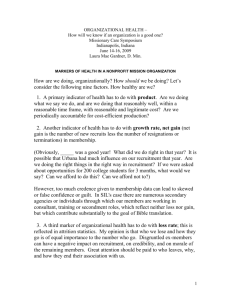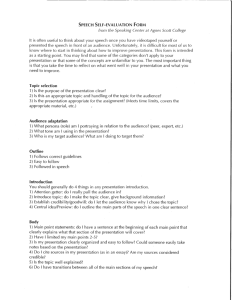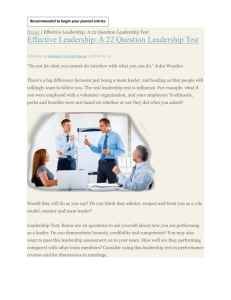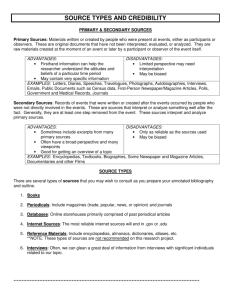Critical Thinking lesson 1 credibility criteria
advertisement
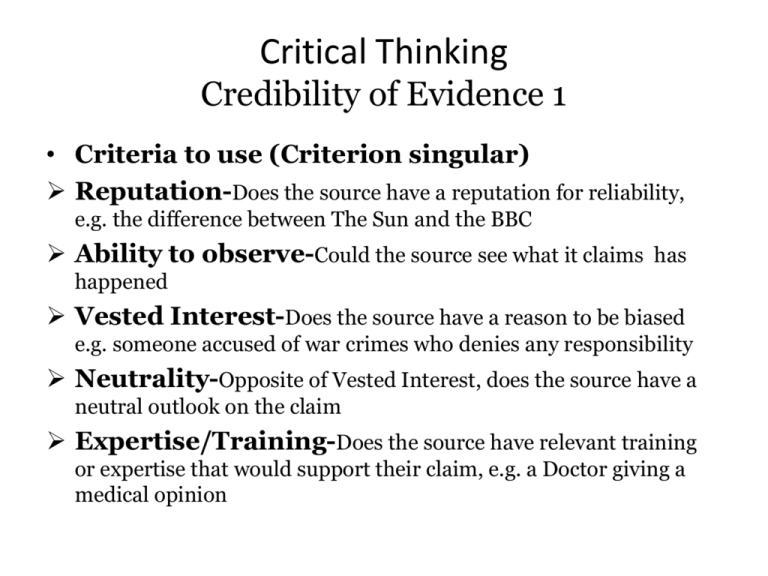
Critical Thinking Credibility of Evidence 1 • Criteria to use (Criterion singular) Reputation-Does the source have a reputation for reliability, e.g. the difference between The Sun and the BBC Ability to observe-Could the source see what it claims has happened Vested Interest-Does the source have a reason to be biased e.g. someone accused of war crimes who denies any responsibility Neutrality-Opposite of Vested Interest, does the source have a neutral outlook on the claim Expertise/Training-Does the source have relevant training or expertise that would support their claim, e.g. a Doctor giving a medical opinion Credibility of Sources • Do you believe the source? • Can you trust the claims being made? Evaluation • • • • • Reputation Ability to See Vested Interest Expertise Neutrality / Bias RAVEN Reputation • What is the track record of the witness? • What is the status of the witness? Reputation • TRACK RECORD - If a person has told lies in the past, then we will be less trusting of them in the future … …Remember the boy who cried wolf? • STATUS - If a person is in a position of authority, like a judge or a professor, then their status suggests that they can be trusted, as they need to be trustworthy to do that job. Whose reputation would you trust? Job Politician Doctor Used car salesman Teacher √ or X Reasoning Ability to See • Were they there to witness what happened? • Did they have a clear view of what happened? Ability to See A person who can see an event happening is more reliable than someone who did not see the event. Use of other senses? Sense Sight Hearing Smell Taste Touch How could this affect a witness’s evidence? Vested Interest • Does the witness have something to gain by telling the truth? • Does the witness have something to gain by telling lies? Vested Interest • Vested Interest is when somebody might have something to gain by lying about something… • A plumber might look at a faulty washing machine and say there is more wrong with it than there really is…So that they can get more work and make more money! I can fix it…… ….. but it will cost you! Vested Interest If somebody has a vested interest, then the credibility of their evidence is weakened, and therefore they are not as trustworthy. Match the situation with the vested interest I’m refereeing an important rugby match I’m being bullied at school I’ve been accused of shoplifting I don’t want to have a criminal record, so I’ll say it wasn’t me I’ve been offered £500 to make sure Saracens win the match I daren’t tell anyone so I’m going to keep my mouth shut Expertise • Does the witness know what they are talking about? • Is their expertise relevant? Expertise • This doesn’t mean that somebody has to be an expert to give evidence, but somebody who knows what they are talking about is more trustworthy than someone who doesn’t. • Expertise relates to whether an observer has the right background knowledge to give evidence on a subject. Does the witness have expertise? A traffic accident has occurred and the following witnesses come forward to give their account Learner Driver Traffic Policeman Primary School Child Jenson Button Motor Mechanic Neutrality / Bias • Is the witness merely a neutral observer? • Or does the witness have reason to favour one particular side of a dispute? Neutrality / Bias • A neutral witness is somebody that doesn’t take a side on the argument. If a person is neutral, they are not influenced either way. • The opposite of neutrality is Bias. If a person is biased, they have already made their mind up about a situation. Bias In War Reporting We: They: Our boys are: Theirs are: Take out Destroy Professional Brainwashed Suppress Destroy Cautious Cowardly Eliminate Kill Heroes Cornered Neutralise Kill Loyal Blindly Obedient Dig in Cower in foxholes Brave Fanatical We have: They have: Our leader is: Theirs is: Army, Navy, RAF A war machine Resolute Defiant Reporting Guidelines Censorship Statesmanlike An evil tyrant Press Briefings Propaganda Assured A crackpot monster Critical Thinking Credibility of Evidence 2 • Criteria to use (Criterion singular) Nature of the claim-Is the claim itself credible, or very unlikely, e.g. when someone claims to have witnessed a miracle Credible reasons for the claim-Can the source support their claim with credible reasons, or is it not supported Corroboration-Is there corroboration of the claim from independent sources, e.g. it is backed up elsewhere You need to be able to use the Criteria in deciding which sources and authorities are credible/reliable and on what grounds Using Credibility Criteria When assessing the credibility of a source you should use whatever criteria you think is relevant, and often will use at least two. EG – An Eye Witness Report Emphasis on the high credibility of direct observation But also Vested Interest – Did the eyewitness have anything to gain by including or excluding evidence Bias – Did the eyewitness observe a friend and try to present them in the best light? Expertise – Did the eyewitness have any relevant expertise which may increase the credibility of the evidence Reputation – Has the eyewitness got a reputation for honesty or dishonesty Corroboration – Is the evidence given by the eyewitness supported by other sources of evidence Selectivity – Did the eyewitness see only part of the event? Context – Did the context allow for a clear view of the event? Here we can see combining different criteria improves our assessment of credibility of evidence Key Terms Argument – A reason or reasons that support a conclusion Evidence – Information used to support an argument Source – Where evidence comes from e.g. eye witness Credibility – Believability, a cr4edable source is a believable source Credibility Criteria – criteria used to assess the credibility of sources and evidence Neutrality – Impartial, not taking sides Vested Interest – Having something to gain from a particular outcome Bias – Favouring a particular view Expertise – Specialist knowledge Reputation – What is generally thought about a person’s character or Standing Observation – Direct observation of an event by an eyewitness Eye witness account – A report by someone who has personally observed an event Corroboration – Confirming, giving support to, Corroborative evidence is evidence that supports each other, point in the same direction. Selectivity – The choice of evidence to support an argument Context – The setting or situation in which evidence is produced Truth – Something that is accurate or correct Credibility of Evidence Can we apply the criteria? Objectives To apply the criteria to multiple evidence to assess its credibility To make judgements on the evidence To start to come to conclusions based on the evidence Table for assessing Multiple Evidence Evidence Letter Criterion applied Effect on credibility Corroboration with…. Table for assessing Multiple Evidence Two Dogs Fighting Evidence Letter A B C D J Criterion applied Effect on credibility Corroboration with….
